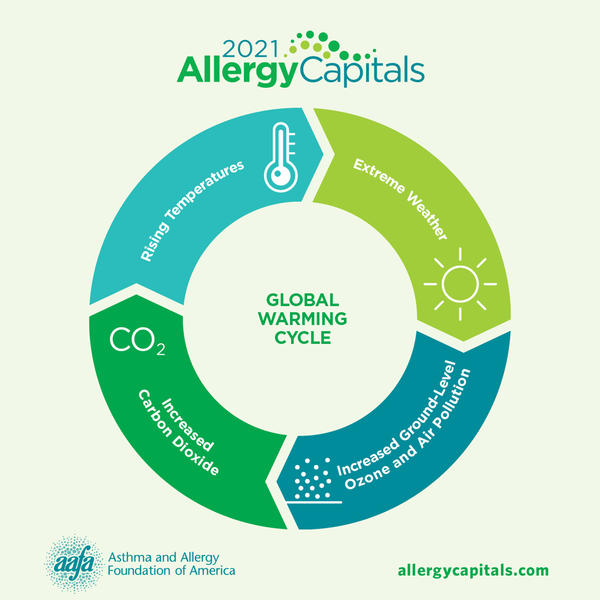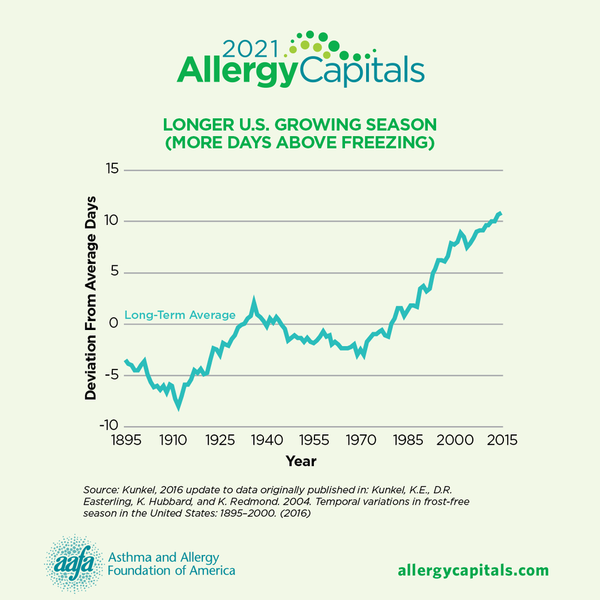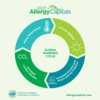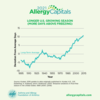Each year, we all say the same thing – “This feels like the worst pollen season ever!” But is pollen really getting worse each year? Or are the annoying symptoms of seasonal allergies just making you think that?
The truth is pollen seasons have been gradually getting longer and more intense due to climate change. The Asthma and Allergy Foundation of America (AAFA) looks at the impact of climate change in our 2021 Allergy Capitals™ report.
A Global Warming Cycle
A global warming cycle is leading to more extreme weather, like heat waves and droughts. These changes in weather can lead to an increase in ground-level ozone and air pollution. This promotes higher carbon dioxide (CO2) levels and results in warmer temperatures. And the cycle continues.

This cycle is causing plants to increase the amount of pollen they produce. This can trigger asthma and allergy symptoms. Rising CO2 levels also contribute to rising temperatures. This gives the plants longer growing seasons. So you are exposed to pollen for more days than in the past.

With warmer, longer seasons, allergy-causing plants can move into new areas. This is troubling. More than 24 million Americans already have seasonal allergic rhinitis, and pollen allergies are a major cause. That number could rise in the coming years due to climate change.
 I stand with @AAFANational in support of clean, safe air for everyone and the enforcement of the Clean Air Act, which reduces harmful emissions causing #climatechange that worsens pollen seasons. Sign up to take action against climate change at https://ctt.ec/v3tfW+
I stand with @AAFANational in support of clean, safe air for everyone and the enforcement of the Clean Air Act, which reduces harmful emissions causing #climatechange that worsens pollen seasons. Sign up to take action against climate change at https://ctt.ec/v3tfW+
“AAFA’s Allergy Capitals™ report helps more Americans make sense of the impact on individual and community health,” says Kenneth Mendez, President and CEO of AAFA. “Two notable parts of our 2021 report include the effect of COVID-19 and climate change on seasonal allergies. In 2020, fewer people felt the impact of pollen allergies. This is likely due to COVID-19 restrictions with more people staying indoors. But climate change continues to cause longer and more severe allergy seasons. If we don’t slow down the cycle, pollen production will only intensify. This means symptoms could worsen as climate change continues to evolve.”
How Can We Slow Down This Cycle?
If we take action now, we can slow down climate change. Contact lawmakers and ask them to create laws to reduce emissions and air pollution. That’s a great place to start. And sign up at aafa.org/join for Advocacy Action Alerts. We let you know when opportunities come up to contact your representatives. In the meantime, talk with a board-certified allergist about treatments for your seasonal allergies, and check out ways to reduce your exposure to pollen in our 2021 Allergy Capitals™ report.
How Can I Learn More About the Report?
The Allergy Capitals™ ranking is an annual research and education project from AAFA. We release the report to help people recognize, prevent, and safely treat allergy symptoms. Through this ranking, AAFA raises awareness about the impact of spring and fall seasonal allergies. It provides helpful information that can improve the quality of life for people living with seasonal allergies.
Visit allergycapitals.com to see the full list and to learn more about allergy diagnosis, prevention, and treatment.
Join our online community where you can get support for asthma and allergies and stay up to date on news and research.



Comments (0)